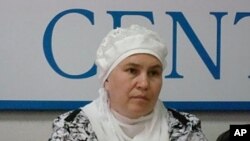The Russian Supreme Court on Tuesday hears an appeal of 12 Muslims from the republic of Tatarstan imprisoned on charges of attempting to overthrow the local government. Russian human rights activists say the case represents an assault on freedom of religion that has the unintended effect of radicalizing Muslims in the Russian Federation.
Farkhat Faizulin is one of 12 Muslims in Tatarstan imprisoned for attempting a violent overthrow of the republic's government. He was also accused of membership in Hizb ut-Tahrir, an organization that seeks to unite all Muslim countries.
Prosecutors presented no evidence of guns or explosives at the defendants' 2007 trial. Instead, they pointed to confiscated Islamic literature, including that of Hizb ut-Tahrir. Human-rights activists say prosecutors extrapolated violent intent from possession of that organization's literature. The defendants deny all charges.
Faizulin's wife, Gulnara Faizulina, told VOA the Supreme Court appeal revolves around procedural matters.
Faizulina says defendants were denied a jury trial and defense motions, witnesses were kept secret and defendants could not properly cross-examine them.
Speaking at a Moscow news conference, the director of Russia's Human Rights Institute, Valentin Gefter, said the issue at stake in the appeal is not the state's war against terrorism, but rather against independent ideas.
Gefter says the struggle in Russia in this specific instance and in the Caucasus is not against ideas or people who may even have radical ideas - certainly not violent ones, but rather it is a struggle against all those who may presumably think differently from local and federal authorities.
Alexei Malashenko, Islamic expert at the Carnegie Moscow Center, says there is no understanding or consistency in Russia as to what constitutes radical Islam. He notes that theological disputes that are common to all religions. He also cites cases when Russian civil authorities get involved in matters of faith.
Malashenko says one needs to think for a second that a judge - a civil authority - can provide instruction about proper or improper religious ritual. Malashenko calls that nonsense, adding that a small-town mayor on the eve of some tragic events in [the Caucasus republic of] Kabardino-Balkaria posted a schedule when people may or may not attend services in a mosque.
Elena Ryabinina of the Human Rights Institute says the state's anti-terrorism operations are creating a large number of innocent victims who are convinced they cannot defend themselves through legal means.
Ryabinina says the more groups fall under the steamroller of repression, the greater the critical mass that emerges. She says although the groups are completely different, they are united by two very powerful factors - a common faith and common trouble stemming from the repressive campaign.
Valentin Gefter says civil interference in matters of religion is turning Islam into a hero among ordinary people. He notes a ruthless campaign against Islamic extremism in Chechnya has been accompanied by orders of what female college students should wear in class. Gefter says that encourages resentment.
Gefter adds that Russian security agencies last year pressured the Russian parliament and President Dmitri Medvedev into eliminating the country's budding jury system in terrorism cases.
The human-rights activist says this has offered the possibility of not only manipulating, pressuring and perpetrating all kinds of outrages during an investigation, but also to get courts to deliver verdicts desired [by authorities].
Alexei Malashenko says there are no exact numbers on how many people are being radicalized by state's war on terror. As he puts it, there are as many Islamic extremists as the authorities need to have at any given time - sometimes they need a lot, sometimes only a few. He notes that Chechen President Ramzan Kadyrov has said there are no more than 500 rebels remaining in his republic. He later told his security forces virtually every Chechen family has a rebel, which would put the number in the many thousands.
Gulnara Faizulina says she does not expect the Russian Supreme Court to rule favorably in her husband's case. A decision should take about three weeks. He has already served three-and-one-half years of a four-and-one-half year term. He could have served a maximum of 20. She notes all of the defendants got less than the minimum 10-year sentence, which she sees as indirect acknowledgment by authorities that they could not prove their case.
If necessary, the defendants plan a further appeal at the European Court of Human Rights in Strasbourg.




